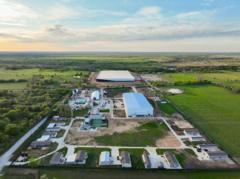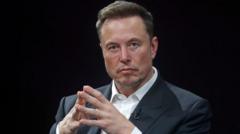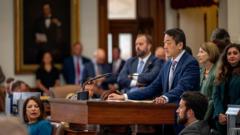Elon Musk, the billionaire entrepreneur, has made headlines with his corporate move from Silicon Valley to Texas, establishing a high-tech campus in the rural region of Bastrop, approximately 30 minutes east of Austin. This new headquarters houses Musk's various companies, including a metal building for X—the newly renamed social media giant—and the expanding facilities for both the Boring Company and SpaceX.
This location, situated on Farm-to-Market Road 1209, marks a strategic retreat from California's political landscape, aligning with a broader trend among tech entrepreneurs seeking new grounds in Texas, where land is more affordable, skilled labor is ample, and political climate favors rapid development. Musk’s transition reflects a notable ideological shift; once aligned with democratic ideals, his criticisms of California's social policies, particularly regarding gender identity, catalyzed his departure.
"Texas has become a desirable haven for tech companies and their workers," notes Sylvia Carrillo, the city manager of Bastrop. Locals express a mixed sentiment towards the influx of Musk's industries, balancing the promise of job creation against the fear of losing the small-town charm. As Bastrop's demographic and economic makeup shifts rapidly, residents find themselves grappling with rising living costs and the potential urbanization of their community.
Project developments near Musk's headquarters stand at a crossroads, as the area is experiencing a boom akin to historical patterns tied to coal mining and lumber. Current efforts to build housing units for Musk's employees, anticipated to include over 100 homes, have faced delays due to environmental concerns like water pollution, which recently plagued the Boring Company's operations.
In a community thus divided, residents like real estate agent Judah Ross view Musk's projects positively, highlighting job growth, while others voice concern online about the impact of corporate interests on local culture and environment. "As long as it's a good neighbor, I don't mind," shares Alfonso Lopez, a local who wishes to see improvements without environmental devastation or disruption.
The city government of Bastrop remains proactive, instigating protective measures like zoning laws aimed at preserving green spaces and curbing overdevelopment. As Musk’s ventures continue to expand, the local government is keen on balancing growth with sustainability, striving to maintain Bastrop’s historical essence while accommodating the shifting skyline of a burgeoning tech hub.
Questions linger regarding the future impact of Musk's development, as the area gears up for economic dynamics influenced by recent government subsidies and free-trade zone designations which promise to boost local employment but raise concerns over civic integrity amidst corporate upheavals. With both excitement and trepidation, Bastrop navigates the complex reality of having Elon Musk as a major player in its evolving landscape.
This location, situated on Farm-to-Market Road 1209, marks a strategic retreat from California's political landscape, aligning with a broader trend among tech entrepreneurs seeking new grounds in Texas, where land is more affordable, skilled labor is ample, and political climate favors rapid development. Musk’s transition reflects a notable ideological shift; once aligned with democratic ideals, his criticisms of California's social policies, particularly regarding gender identity, catalyzed his departure.
"Texas has become a desirable haven for tech companies and their workers," notes Sylvia Carrillo, the city manager of Bastrop. Locals express a mixed sentiment towards the influx of Musk's industries, balancing the promise of job creation against the fear of losing the small-town charm. As Bastrop's demographic and economic makeup shifts rapidly, residents find themselves grappling with rising living costs and the potential urbanization of their community.
Project developments near Musk's headquarters stand at a crossroads, as the area is experiencing a boom akin to historical patterns tied to coal mining and lumber. Current efforts to build housing units for Musk's employees, anticipated to include over 100 homes, have faced delays due to environmental concerns like water pollution, which recently plagued the Boring Company's operations.
In a community thus divided, residents like real estate agent Judah Ross view Musk's projects positively, highlighting job growth, while others voice concern online about the impact of corporate interests on local culture and environment. "As long as it's a good neighbor, I don't mind," shares Alfonso Lopez, a local who wishes to see improvements without environmental devastation or disruption.
The city government of Bastrop remains proactive, instigating protective measures like zoning laws aimed at preserving green spaces and curbing overdevelopment. As Musk’s ventures continue to expand, the local government is keen on balancing growth with sustainability, striving to maintain Bastrop’s historical essence while accommodating the shifting skyline of a burgeoning tech hub.
Questions linger regarding the future impact of Musk's development, as the area gears up for economic dynamics influenced by recent government subsidies and free-trade zone designations which promise to boost local employment but raise concerns over civic integrity amidst corporate upheavals. With both excitement and trepidation, Bastrop navigates the complex reality of having Elon Musk as a major player in its evolving landscape.



















